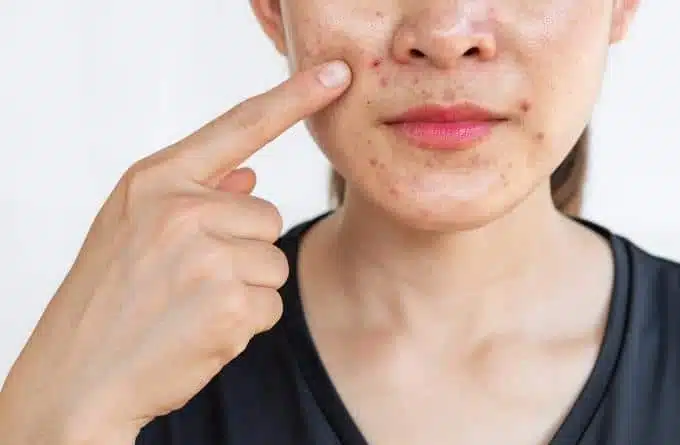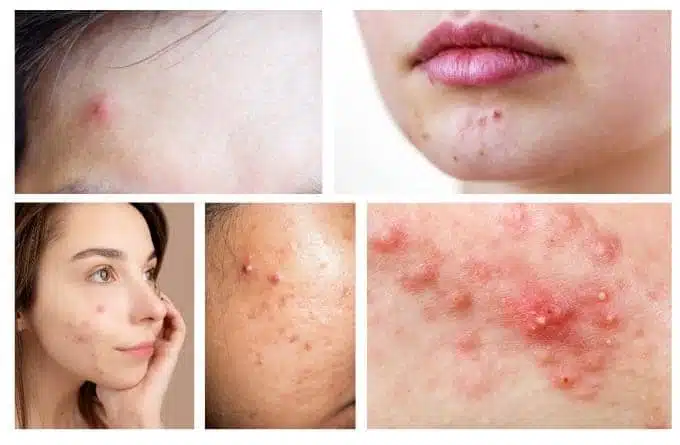dùng cồn trị mụn đầu đen có
-
Medical alcohol can help treat acne?

Medical alcohol (cồn y tế ) is most commonly consumed as an antiseptic that dissolves bacterial wounds and can cause infection. Cuts, scratches and anomalous injuries are treated with alcohol to prevent fatal disease. 1 Some people also believe that alcohol's antimicrobial properties can help clear the skin of blemishes.can conveniently see the charm. Rubbing alcohol creates a sense of weightlessness on the skin, cleanses grease and dries up quickly. It is also commonly used as an astringent and as an astringent. Medical alcohol is a basic ingredient of universal acne products, but is rubbing alcohol directly good for the skin?
What is medical alcohol?
Medical alcohol (also known as ethanol alcohol) is the most commonly consumed sterile substance. It is a transparent, colorless, bitter-aromatic liquid that is miscible with other common solvents. Isopropyl alcohol is found in many products such as perfumes, cosmetics, inks, disinfectants, window medicine, nail polish removers, etc.
Medical alcohol contains 70% ethanol and 30% water to provide a strong antiseptic for wounds. In the US, sulfuric acid is mixed to speed up the distribution, and a small amount of this ingredient will remain in the final product.
common skin irritants
No secret to solving this problem - medical alcohol is not low for all skin types. Ohio State Wexner Medical Center recommends that you do not use medical alcohol or hydrogen peroxide on your wound or to control oily or acne-prone skin. Dry, messy, and oily skin can all be damaged by isopropyl alcohol's ability to de-oil.
Alcohol wound treatment is usually beneficial, but continued consumption can cause acne, rashes, or worse for already healthy skin. Rubbing alcohol kills skin cells, which can then clog pores. Its anti-microbial properties also eliminate the "good" bacteria that remain on the skin. Low bacteria are also known as "microbiomes" and help preserve your skin against infection. The pattern that removes good bacteria on the skin can make you sick and infected.

Acne is formed when pores are penetrated by dead skin cells, dirt, and debris. The residue mixes with oils secreted by the sebaceous glands, leading to clogging of the pores. Acne develops red and inflamed due to bacterial infection.Your skin carries a moisture barrier that helps keep skin hydrated and controls skin security from debris in the environment. This barrier is made up of lipids (healthy fats) that help preserve the skin. Without it, the skin becomes chapped, dry, infected, and pimple. Rubbing alcohol will break this barrier cauldron.
Brighter skin in as little as 2 weeks.
This 3-step process combines the most effective (clinically proven) acne ingredients with a powerful botanical mind to help nourish your skin, making it look new and bright.
Isopropyl alcohol also increases the risk of a skin condition known as follicular keratosis. This skin condition stimulates the overproduction of pore skin cells located on the sebaceous glands that deliver oil. At that time, the skin inside the pores will peel off cells more rapidly than the pores can expel them, keeping the oil underneath the dead skin layer. This causes bacteria and debris universally to accumulate under cells, leading to an outbreak.
Alcohol helps line remove oil accidentally on your skin
Although medical alcohol is a cheap option as a potent aseptic, you don't need to consume it for clean skin. Actually, it can do more general harm than good. It removes the majority of oils and healthy bacteriaon your skin to keep your skin hydrated and youthful. When the skin is dry, the body signals the sebaceous glands to produce oil to secrete more sebum, which actually causes your skin to secrete more oil. Even oily skin will get irritated.
There are cheaper toners like witch hazel that can help preserve skin. The National Library of Medicine has published a study of the Inflammatory journal, showing that extracts such as Witch Hazel and other products have been tested with positive security control effects.
Avoid alcohol-based skin care ingredients
products intended for skin containing medical alcoholThe next time you approve through the aisle of the upcoming pharmacy, be wary of bringing products containing medical alcohol. 1 Some of your favorite skin care products may contain harmful alcohol, which can be the cause of irritation and breakouts. These are just a few of the products:
Witch Hazel distilled: despite its name, this product is essentially alcohol, not witch hazel at all. Witch hazel is a great accidental astringent that can help close pores and tone skin, but make sure you reach for the extract in the water in the hazel space, not alcohol. Your skin retains moistureMud masks: Beware of mud masks that are said to use "all-natural" ingredients. Always read the label to make sure it does not contain isopropyl alcohol, as even though the mud will soothe the skin, the alcohol will irritate the skin.
Cosmetic removers: Some makeup removers contain medical alcohol. It is used to help reduce fluid thickness and dissolve substances such as mascara and eye makeup. Cosmetic removal can be characteristically complex because people tend to rub their skin vigorously to remove makeup.
Sunscreen: Did you get pimples when you applied sunscreen? Your kohl sunscreen could be the culprit. Of course, we know that sun exposure can make acne worse. Buy non-alcoholic sunscreen to protect your skin from UV rays and dry flaky skin.
good alcohol and bad alcohol
Not many lines of alcohol are bad. In fact, in the right amount, there are a number of ingredients that can help keep skin clean and blemish-free. It's important to know the difference:Bad alcohol
These alcohol samples are used as preservatives due to their bactericidal properties. They are abundant in skincare therapies because they enhance absorption and act as solvents, allowing other ingredients to mix. The majority of these ingredients can make acne worse. A study by the medical journal Occupational and Toxicology found common effects of topical ethanol may include skin irritation or allergic contact dermatitis.- Benzyl Alcohol
- artificial alcohol
- ethyl alcohol
- isopropyl alcohol
- Methanol
- alcohol SD
good acne treatment alcohol
Called "waxy" or "fatty" alcohols, these are alcohols that cause a range of fats and oils naturally occurring in the environment. They can be found in plants or fruits like coconuts but can also be produced in the laboratory. These alcohol samples act as emulsifiers to accommodate smooth creams and moisturizers. Be warned that even these alcohol can irritate sensitive skin, so test a small area of skin first before using.- Cetearyl Alcohol
- Cetyl alcohol
- Glycol
- Stearyl alcohol
When it comes to skin treatment, there are popular more affordable alternatives to medical alcohol. Not using harsh chemicals on your skin will lead to the loss of the healthy oils. Talk to QuangTrungChem today about simple skin treatments and lifestyle changes that can leave your skin flawless.